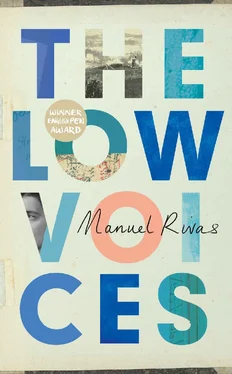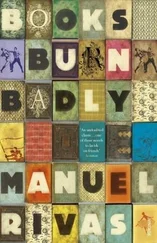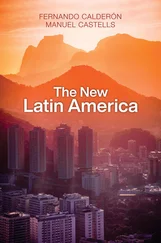Manuel Rivas - The Low Voices
Здесь есть возможность читать онлайн «Manuel Rivas - The Low Voices» весь текст электронной книги совершенно бесплатно (целиком полную версию без сокращений). В некоторых случаях можно слушать аудио, скачать через торрент в формате fb2 и присутствует краткое содержание. Год выпуска: 2016, Издательство: Harvill Secker, Жанр: Современная проза, на английском языке. Описание произведения, (предисловие) а так же отзывы посетителей доступны на портале библиотеки ЛибКат.
- Название:The Low Voices
- Автор:
- Издательство:Harvill Secker
- Жанр:
- Год:2016
- ISBN:нет данных
- Рейтинг книги:5 / 5. Голосов: 1
-
Избранное:Добавить в избранное
- Отзывы:
-
Ваша оценка:
- 100
- 1
- 2
- 3
- 4
- 5
The Low Voices: краткое содержание, описание и аннотация
Предлагаем к чтению аннотацию, описание, краткое содержание или предисловие (зависит от того, что написал сам автор книги «The Low Voices»). Если вы не нашли необходимую информацию о книге — напишите в комментариях, мы постараемся отыскать её.
A brilliant coming-of-age novel from one of Spain’s greatest storytellers,
is a humorous and philosophical take on memory, belonging, and the nature of storytelling itself.
The Low Voices — читать онлайн бесплатно полную книгу (весь текст) целиком
Ниже представлен текст книги, разбитый по страницам. Система сохранения места последней прочитанной страницы, позволяет с удобством читать онлайн бесплатно книгу «The Low Voices», без необходимости каждый раз заново искать на чём Вы остановились. Поставьте закладку, и сможете в любой момент перейти на страницу, на которой закончили чтение.
Интервал:
Закладка:
Spring arrived. The Weatherman withdrew his pointer for several days, and a better job turned up. My father was asked to build a small house for some neighbours, the Baleiros, a family who had emigrated to the north of England. When he returned to his work, next to the emergent Baleiro home, my father drew a circle early one morning and set about digging. First, with a hoe. It was black earth, good earth, that let itself be sifted. There then appeared a layer of muddy sand mixed with stones. It stuck to the pickaxe and was heavier to shovel. The day was sunny, and my father dug down with happy excitement, convinced that this time he wouldn’t be beaten by the void. It smelled of water. He could hear the murmurs. At dusk, the spring was already licking his boots. By nightfall, he came out of the well with festive splashing, water around his ankles. The well, on that first day, must have been about two metres, a little above his head.
It hurt him, the way the well dried up. The way the spring made fun of him. One day, he brought along a water diviner. He called him ‘Mister Dowser’. The old man seemed very professional. He scoured the hillside with a thin stick that seemed to emerge from his fibrous hands like a strange eleventh finger he could roll and unroll. At one point, he stopped. He lowered his head, like someone hearing the first whimper of water, and the stick appeared to move, almost vibrating. But it was only a passing shiver. He repeated the operation with a pendulum, a chain from which he hung a cylindrical object with a conical point like a bullet. Nothing. It didn’t move anywhere in the garden. That stupid pendulum might have moved inside the house. The old man didn’t want to be paid. He really was a gentleman. There was a hydric sadness in his eyes. The spring remained silent, hiding somewhere. My father’s face stiffened that evening when the Weatherman appeared on the television in Leonor’s pub, with his infallible stick. The pointer, again, directly over our house.
10. The Celtic Treasure and the Astronaut
IN RESTLESS PARADISE, we lived from one day to the next, but also in history. In the school account, history mimicked the flight of a bird of prey over the Castro henhouses. It turned up suddenly, as if it had come not from another place on earth, but from a forest rooted in the clouds. It then went into a helicoidal flight, a succession of perfect curves, until accurately pouncing with its claws on the target. The present — that was its prey. In the accounts of the low voices, the movement of history resembled the flight of a bat. There’s a bat that still flies on the dark side of my memory. Somebody found it in a granary, where it was sleeping its long winter sleep, hanging from a beam. We woke it up. We seized it by the tips of its wings. We tried to make it fly by throwing it against the light of a street lamp. The bat sluggishly moved its wings, tried to escape the nightmare, but fell down again. In the first act of unkindness, we found something comical about its face, with its human features. Until we became aware of the amazement in its blind look. Animals help us see. If there’s a flight I find fascinating, it is the flight of bats. It was a gift of guilt. The complete disarray, the unexpected twists and turns, the disruption of perspective, being visible and invisible at the same time. A total irony of the senses. Hallucinatory present.
Unlike the historical chronology of school lessons, its heavy-machinery, unperturbed advance, in the accounts of the low voices tenses and episodes got mixed up. In appearance. As in the flight of a bat. As in the cubist print of a carnival. Near the ruins of the ancient indigenous settlement, on the best lands in Elviña Valley, expropriated by means of intimidation, they stuck a powerful factory for chemical fertilisers, Cross Fertiberia. The fruit trees soon fell ill, and the birds that used to alight on them disappeared. The Roman expedition by sea to quell the Artabrian rebels, the first Viking attack on the peninsula, the Battle of Elviña in 1809, the barbarities of 1936, all formed a succession of crazy acts that got mixed up in time. The large rock where Sir John Moore had his control post and was mortally wounded is popularly known as the Crag of Goliacho. Ana Filgueiras searched every nook and cranny in Castro for the root of this name. She wondered why it had to be Goliacho. And an old man replied with biblical precision, ‘That comes from the time David defeated Goliacho.’ Now, in the hallucinatory present, the contaminative factory had arrived. The wind scattered pollen, but also a futuristic plague. We grew up surrounded by an optimism about progress. When we came out of school, at midday, a plane would pass overhead on its way to Alvedro Airport, and we would greet it enthusiastically, running along, waving our arms about and shouting in the hope we might make ourselves heard, ‘Sweets, sweets!’ Some old people would mutter under their breath, ‘Beetles, more like. That’s what they’re going to throw down. Beetles!’ In summer, we would sometimes go down to Santa Cristina Beach, a merry band of boys and girls singing, ‘Tourist one million nine hundred and ninety-nine thousand nine hundred and ninety-nine!’ And old Pego, who used to graze a tiny flock of depressed sheep, would murmur, ‘The winter will be here soon enough!’
But there were still treasures to be found. Going in search of treasure didn’t seem such a stupid idea. If an old woman told us there was a golden beam from Os Curutos to O Lagar, for us children this wasn’t a story, but a piece of confidential information. The question was how to get hold of it. On the hill, Os Curutos, were the ruins of the city that put up a fight against the Romans. The teacher told us one day, in a serious voice, that we owed everything to the Roman Empire. But who were these earlier builders? They had an obsession with circles. They made circular houses with circular forts. Could they communicate? They probably said, ‘Boh!’ The ruins were fairly complete. A thick cobweb of undergrowth covered the three circular walls, the labyrinthine alleys and the mysterious cistern of the ancient settlement. They carried out an archaeological dig there from 1947 to 1952, and discovered the treasure of Castro de Elviña, which is kept in the museum of St Anthony’s Castle. It is said to have belonged to a priestess. One of the objects is the diadem with a clasp in the shape of a bird, a wonder of Celtic craftsmanship. I’ve often gazed long and hard at this golden palmiped. It seems to swim in the symmetry of ornate curves. It’s funny. The finest artistic heritage from our ancient Galician past is two feminine objects: the Castro diadem and the Caldas de Reis comb. Apparently, very few weapons turned up during the excavations. Who knows what significance this holds?
So there we were, playing at hunting for treasure. Calmly. Most of all in Castro, but also in A Casa Vella and the woods of A Zapateira, where Soult’s French troops and Moore’s light infantry of Highlanders engaged. We carried farming implements and dug like that crazy Schliemann in search of Troy. That was all the metal we ever found — other rusty implements. Iron came face to face with its own ghost. The most extraordinary discoveries were the skeleton of a bike, a few cans of beer and some prehistoric condoms. But the treasure was there. We could feel the presence of the golden duck. We really could. Though what we heard was the constant hum, like a warning, of the high-voltage tower they decided in the years after the war to plant right on the ara solis of the most important castro along this coast. We were children playing, and yet, without knowing anything of history, we knew there was an element of symbolic fatality, of humiliation, in the brutal fact of having stuck the tower in the heart of this ancient settlement. To warn of the risk, there was a sign with a drawing that showed a little man being zapped by a bolt of lightning. The electric hum inside our heads was very strong. Whenever a storm drew near, the sound would transmute into a grinding of teeth. There is a continual debate going on in Galicia as to whether the Celts were here or not. Not long ago, on the Portal Galego da Língua website, the debate about a Celtic presence was reignited due to an article by Fermín Bouza. Sparks were flying off the Internet. I had to exercise a great deal of self-control not to send a piece of confidential information that emanated from my childhood, which the others knew nothing about: ‘Stop scratching your heads. Stop turning the question around. The Galician Celts all died of electrocution!’
Читать дальшеИнтервал:
Закладка:
Похожие книги на «The Low Voices»
Представляем Вашему вниманию похожие книги на «The Low Voices» списком для выбора. Мы отобрали схожую по названию и смыслу литературу в надежде предоставить читателям больше вариантов отыскать новые, интересные, ещё непрочитанные произведения.
Обсуждение, отзывы о книге «The Low Voices» и просто собственные мнения читателей. Оставьте ваши комментарии, напишите, что Вы думаете о произведении, его смысле или главных героях. Укажите что конкретно понравилось, а что нет, и почему Вы так считаете.












